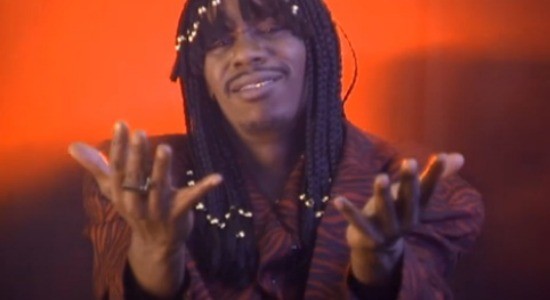
On Wednesday, February 11th, 2004, an atomic bomb of pop culture went off, unexpectedly becoming one of the defining moments of the decade. Mere days after Justin Timberlake exposed Janet Jackson's nipple at halftime of the Super Bowl and the launch of Facebook came a half-hour of programming that lead to hours-upon-hours of popular quotation. It was on that night that Comedy Central's “Chappelle's Show” first aired the infamous “Charlie Murphy's True Hollywood Stories” episode that reintroduced Rick James to a generation. This week, that episode turns 10, and it's only fitting that we take a look back at the decade of “I'm Rick James, Bitch!” that followed.
]
The story begins, rightfully so, with the actual legend of Rick James. Born in Buffalo, New York, James would sing on the corner with his friends and, after a well-received performance in front of his school, decided to pursue music full time. After landing in Canada following going AWOL from the Navy, he formed his first band The Mynah Birds, whose line-up at one point also featured Neil Young.
James returned to the US and served time for deserting the Navy. Following that, he relocated to Detroit, put together his Stone City Band and began his career as a solo artist. On Motown's Gordy imprint, James released the number one single “You and I,” and the cult smash “Mary Jane,” one of the most treasured tribute to marijuana in the American canon.
[
While James continues to have numerous chart-topping R&B smashes, it was his unapologetically rambunctious “punk funk” that defined his legacy and influenced countless generations in his wake. His biggest smash, “Super Freak,” not only introduced the concept of being “super-freaky” to the English lexicon, but became an accessible cornerstone for artists and listeners alike to open the floodgates of progressive funk in the pop world. But while listeners embraced it, “Super Freak” also signaled James' biggest moment as a force of conscience in the music industry as he became the first major artist to vocally criticize a fledgling MTV for not playing music made by black artists. Some theorists suggest it was James' outspokenness that eventually persuaded MTV to begin airing videos from artists like Herbie Hancock, Prince and Michael Jackson, whose work, if memory serves me right, was put into regular rotation by the network.
By the time the “Chappelle's Show” sketch aired, a generation or two had passed without Rick James in the public eye. Outside of the scandals, including admitting to spending $7,000 a week for half-a-decade on drugs and three different hostage/assault accusations that saw him spend two years in prison, and the sampling of “Super Freak” by MC Hammer for “U Can't Touch This” (which resulted in the only Grammy of James' career) his musical legacy hadn't held the overt gravity of his contemporaries. Which is why the “Chappelle” episode is something of a double-edged sword. On one hand, it introduced James to thousands. “I'm Rick James, Bitch!” became inescapable for years, to the point where New York t-shirt vendors still sell the image/catchphrase on bootleg merchandise to tourists this very day. But while it did reintroduce James to the pop culture conscious, his death six months later cast an unfortunate cloud over his sudden resurgence.
But that six month period of James' life between the episode airing and his death does go overlooked to a degree. The self-awareness and, despite his ravaged appearance, genuine charisma that shined through in the “Chappelle's Show” sketch not only resurrected interest in the man's work, but allowed him the spotlight for one last victory lap. That June he was honored at the 17th Annual Rhythm and Soul Awards, as well as receiving a Lifetime Achievement Award from The American Society of Composers, Authors and Publishers. These acknowledgements for both his solo work as well as for bringing out the music best in everyone from Teena Marie to late-era Temptations to even Eddie Murphy at least would have giving the autobiography he was working on at the time of his death a happy ending. Yes, the “Chappelle's Show” sketch, despite the efforts of a decade of overkilling frat boys, is still funny and it's always better to be remembered than be forgotten, but hopefully the legacy of Charlie Murphy's memories reenacted serve as not just a humorous caricaturization, but a gateway into the incredible catalog of Rick James.

